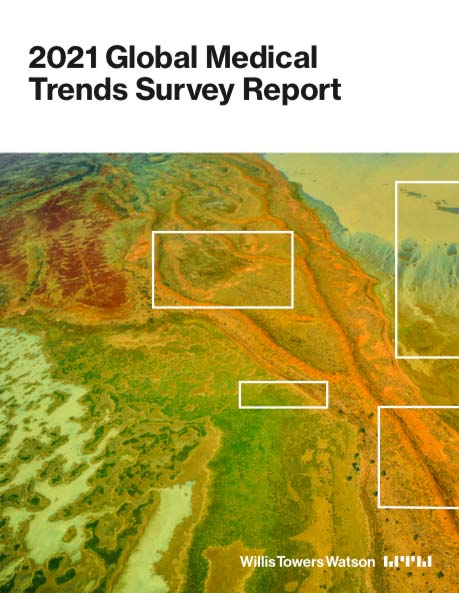The 2021 Global Medical Trends Survey published by WillisTowersWatson reveals that while Covid-19 has led to a significant reduction in healthcare use and overall costs during 2020, the decrease will be short-lived.
The company surveyed 287 insurers across 76 countries and says projected healthcare benefit costs will rebound to 8.1 per cent globally in 2021 (up from this year’s 5.9 per cent). Closer to home, the authors of the report predict the average increase in the Asia Pacific region in 2021 will be 10 per cent.
Looking beyond 2021, the report says more than two-thirds (67 per cent) of respondents expect medical costs will continue to rise over the next three years. However, only 40 per cent of Asia Pacific insurers expect a higher medical trend.

Telehealth
The report says the pandemic has helped accelerate the adoption of telehealth (remote GP consultations) with half of insurers globally currently offering telehealth across all plans.
In the Asia Pacific region the company says that pre-Covid-19, 56 per cent of insurers said none of their insured members used telehealth to access GP services. Today that figure 4 per cent.
By the end of 2021 a quarter of insurers expect that 20 to 29 per cent of insured members will use telehealth to access GP services.
“Although it’s still early days and many issues around telehealth need to be resolved, including its place in plan design, we believe that telehealth is here to stay,” says the report.
The cost burden of mental health conditions is expected to grow…
Other findings in the 21-page report include that a significant factor contributing to rising medical costs related to company schemes is the overuse of care.
“While 65 per cent of insurers (globally) are most concerned about providers driving up costs by over-prescribing or recommending too many services, 55 per cent also cite overuse of care due to insureds seeking inappropriate care,” says the report.
Mental health
The cost burden of mental health conditions is expected to grow, says the report.
Currently, respondents rank cancer (80 per cent), cardiovascular diseases (56 per cent), and conditions affecting musculoskeletal and connective tissue (41 per cent) as the top three conditions currently affecting medical costs.
However, about four in 10 respondents predict mental health conditions will be among the three most common conditions affecting costs within the next 18 months (40 per cent) and among the three most expensive in the next 18 months (39 per cent).
The report also says there are gaps in coverage for alcoholism, drugs and HIV/AIDS.
“Between 50 per cent and 53 per cent of group policies regardless of size include exclusions for alcoholism and drug use, while between 41 per cent and 47 per cent exclude on the basis of HIV/AIDs,” says the report.
See our story: Nib Signs Up For Online GP Consults With Tend.





